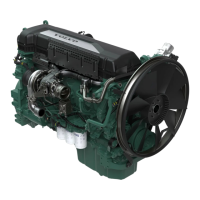Operation
Correct operating technique is very important for both fuel economy, environmental protection and engine life.
Always let the engine warm up to normal operating temperature before operating at full power. Avoid sudden
throttle openings and operation at high engine speed.
Reading the Instruments
Check all instruments directly after starting, and then
regularly during operation.
NOTICE! On engines in continuous operation, it is
recommended that the lubrication oil level is checked
at least every 24 hours. Refer to Oil level, checking and
topping up.
Alarms
If the EMS receives abnormal signals from the engine,
the control unit generates fault codes and alarms, in
the form of lamps and audible warnings. This is done
by means of CAN signals to the instrument.
More information about fault codes and fault tracing
can be found in the chapter Fault
handling, page 46.
Maneuvering
Operation at low load
Avoid long-term operation at idle or at low load. It takes
a long time for the engine to reach working
temperature, resulting in high viscosity of the oil and
large clearances in the engine mechanics. In cold
climate, it takes even longer.
The combustion temperature and cylinder pressure
can become so low that an effective combustion
cannot be ensured. At these conditions unburned fuel
could dilute the lubricant oil. Because of the low
cylinder pressure, the piston ring performance could
be affected causing oil from the crankcase to pass the
rings and go further out with the exhaust gases. This
mixture of unburned fuel and oil in exhaust gases is
referred to as “slobber”. A new engine produces more
“slobber” at low load compared to an engine with more
hours of operation.
At low load, the pressure in the turbocharger is low and
oil could seep past the turbocharger seals and mix with
the air into the engine. The consequences can be
carbon build-up on valves, piston crowns and the
exhaust turbine, which could affect engine
performance.
47711296 01-2019 © AB VOLVO PENTA 41

